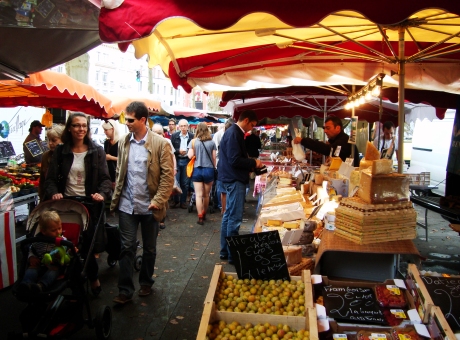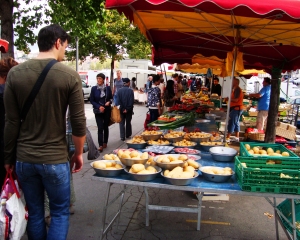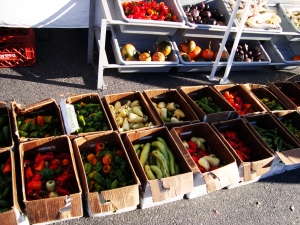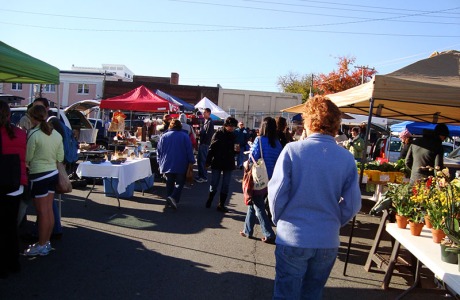One of my greatest and most frequent pleasures in Lyon is to visit the marché en plein air, the farmers’ market. There is a nice one not more than five minutes’ walk from my host family’s apartment. Stands of produce, flowers, sausage, and bread materialize early every morning in a colorful two-block corridor that borders the Saône. The market is especially large on Sunday mornings, with vendors hawking oysters, dried fruit, olives, rotisserie chicken, mushrooms, preserves, and honey. My personal favorites are the vendeurs de fromage, whose refrigerated carts display a dazzling and pungent variety of artisanal cheeses. The more expensive varieties, like Tome de Savoie and Comté, come in huge wheels with delicately mottled crusts. But for poor students like me, there are little cakes of homemade goat cheese and generous hunks of blue cheese to be had for 2 euros or less.
Besides the quality of the dairy products, a few things about this Lyonnais market have really impressed me. Firstly, there is the the matter-of-fact practicality of it. People come armed with large baskets and carpet bags to buy their produce for the week. There is no visible municipal intervention: no public servants, no special amenities, no shelter or banners or signs. The market sets up on a wide piece of asphalt that. When it has been dismantled and packed away, all that remains is an innocuous stretch of riverbank sidewalk. Furthermore, there is no eco-tourism here. The market’s patrons are buying local food because it’s fresh and accessible, not because they are on an environmental crusade or think that handmade sausage would make a charming gift. Patrons are also unlikely to inquire whether the beef they are buying is grass-fed or the chicken free-range.
This practicality is in sharp contrast with the character of Charlottesville’s City Market. A 2012 report by Market Ventures Inc. showed how disproportionately well-off and educated visitors to the market are; indeed, a majority have graduate degrees. They come to make small purchases and to chat with others who share their cultural capital and sociopolitical backgrounds–not to do their weekly groceries. And while the City Market may appear informal because of its location (a parking lot), the municipal government is very much involved in its operation and planning. The Charlottesville City Council even has ambitions to integrate it into a “mixed use market district.” Such a district would provide market-goers with shelters, green space, and running water, while allowing the city to develop a valuable plot of public land and use the market’s economic power to benefit a number of permanent small businesses.*
A second thing that stands out about the Lyonnais marché is the absence of any businesses or kitchen gardeners. Charlottesville takes great pride in hosting the largest farmers’ market in the region, but farmers make up only a portion of the vendors. Shenandoah Joe’s, a local coffee enterprise with several cafés, and Great Harvest Bread Company, a national franchise, have both gotten permission to man stands. There are also a fair number of people who come to sell pies they’ve made in their kitchens or apples they canned in their backyard. In Lyon on the other hand, all the vendors seem to be full-time farmers and artisans. This means that their farms and crafts must furnish them with a substantial and regular profit– freeing them from the need to have second jobs or open cafés. Of course, the fact that Lyon is a city of one million people and can support daily markets plays a big role in this. Charlottesville’s population is certainly too small to do the same. But the solvency and independence of farmers and artisans here also hints at an agricultural economy and legal framework favorable to their existence.
For me, there is no question that a small farm and market culture is beginning to gather strength in Charlottesville, and that it will continue to do so. But it will be under the wing of the local food movement. Charlottesvillians who shop at the City Market are making a conscious choice to support local farmers, act in an environmentally friendly way, and participate in a local cultural event. But in France, the local food infrastructure may never have disappeared, and so has no need to be revived. A Lyonnaise going to the market is not trying to help a farmer or make a political statement. She just wants to buy her cheese.
*See Charlottesville Tomorrow’s coverage: http://www.cvilletomorrow.org/news/article/16309-city-market-proposals/




Claudia, Your blogging has really developed! I can tell you are using the reporting skills you learned from Charlottesville Tomorrow! Your observations seem to penetrate to the essence of the matter. It’s obvious you spend lots of time thinking about and researching these places that you’ve come to know so well.
It is so wonderful to read your wonderful writing, to hear your poignant observations, and to learn more about Lyon and Charlottesville!
I’m so glad you are using this experience to gain such invaluable insights and I’m proud to call you my friend!
Thanks, Erik, that means a lot. It’s amazing how effective an exercise writing is for sharpening up my thought process. It forces me to explain to myself the things I’m encountering in Lyon. But it’s also very nice to know there’s someone reading my entries!